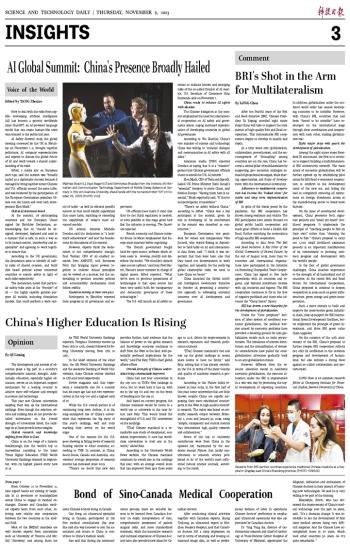
Eighty-five years ago, Norman Bethune, a Canadian doctor, built a bridge of friendship between China and Canada through his selfless spirit. Today, the Bethune Medical Development Association of Canada (BMDAC) continues to carry this spirit and deepen medical cooperation between the two countries.
Honoring Bethune's spirit
Canadian cardiac surgeon Dr. Lee Errett told Science and Technology Daily, "My Chinese colleagues in Canada said that they need help because China is developing rapidly and needs some guidance. I've been interested in this sort of work for a long time, so I came."
On his first arrival in China in 1999, Errett found that China needed to do a lot of work in medical infrastructure construction and education development. "If we were more organized, we could take larger groups, not just cardiac surgery, and could solve more medical problems," said Errett. Hence, a more organized group, the BMDAC, was established in Canada in 2011.
Since its establishment, the BMDAC has organized 19 trips to China for free medical consultations, providing treatment in excess of 1000 patients, completing more than 500 surgeries, and holding no less than 600 academic lectures.
At the same time, the association also arranged for over 140 Chinese doctors to go to Canada for short-term studies. Even during the COVID-19 pandemic, the association still managed to organize 26 online medical lectures.
In addition, the BMDAC organized a campaign to donate urgently needed medical supplies such as ECMO (extracorporeal membrane oxygenation) and masks to the Wuhan medical team. During the severe pandemic situation in Canada, it also received various stocks of medical supplies from China, which were promptly distributed to hospitals, clinics and nursing homes across Canada.
Errett believes that BMDAC's medical journeys in China and exchanging epidemic prevention supplies, have truly followed the spirit of Bethune.
Promoting medical exchanges
With the support of the Ministry of Science and Technology and the Ministry of Human Resources and Social Security, the BMDAC resumed its operation in China after a three-year pause.
From October 10 to November 11, nine expert teams are visiting 27 hospitals in 12 provinces or municipalities across China to engage in medical exchanges. Chinese and Canadian medical experts learn from each other, injecting new vitality into cooperation between the two countries in the medical field.
Most of the BMDAC members are well-known experts from universities such as University of Toronto and McGill University, and among them are some Chinese doctors living in Canada.
Gao Song, an ultrasound specialist living in Canada, participated in the free medical consultations this year. She said she was honored to join the association and return to China to contribute to China's medical needs.
Gao said that during the communication process, there are valuable lessons to be learned from Canadian doctors' in-depth interpretation of data, comprehensive assessment of patient surgical risks, and more standardized treatment, while the innovative research and technical experience of Chinese doctors have also provided new ideas for Canadian doctors.
After conducting clinical activities together with Canadian experts, Zhang Youhong, an ultrasound expert in Meizhou People's Hospital, said that Canadian doctors left a deep impression on her in terms of retaining and reusing ultrasound image data, as well as professional division of labor in operations. Chinese doctors' proficiency in esophageal ultrasound operations was also appreciated by Canadian doctors.
Dr. Ying Tung Sia, director of cardiovascular research and chief of cardiology at Trois-Rivieres Center Hospital of University of Montreal, appreciated the diligence, dedication and enthusiasm of Chinese doctors in their pursuit of learning new technologies. He said he is very willing to be part of the training.
Meanwhile, Errett, who has witnessed the improvement of China's medical technology over the past 24 years, said, "It's a dramatic change. It was incredible to see the development of first class medical centers doing very difficult surgeries. And the Chinese have accomplished those in 20 years, which took other countries 50 years. So it's quite remarkable. "


 Next
Next




